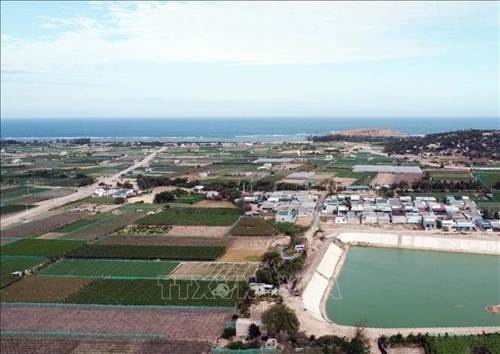Actively joining international nuclear conventions
Developing nuclear power is almost the only technology that must fully comply with international supervision and cooperation regulations, particularly in nuclear safety, security, and safeguards - an effective mechanism to ensure the safe, secure, and responsible operation of nuclear power plants and their integration into the national grid.
Therefore, Vietnam, like other first-time nuclear power developers, needs to fully participate in international treaties on nuclear development, experts said.
    |
 |
|
The area planned to build the Ninh Thuan 2 nuclear power plant in Ninh Hai district, Ninh Thuan province |
According to Prof. Pham Duy Hien, an atomic energy expert and former Deputy Director of the Vietnam Atomic Energy Institute (VAEI) under the Ministry of Science and Technology, Vietnam has been actively participating in international conventions under the sponsorship of the International Atomic Energy Agency (IAEA). As an official IAEA member since 1957, Vietnam has focused on nuclear safety and security, and the non-proliferation of nuclear weapons.
Vietnam also joined the Treaty on the Non-Proliferation of Nuclear Weapons (NPT), one of the fundamental international legal instruments of the global non-proliferation regime, which holds significant importance for almost all nations, including both nuclear-weapon and non-nuclear-weapon states.
Through its participation in the NPT, Vietnam has received support from the IAEA in maintaining the Da Lat Nuclear Reactor and implementing many important nuclear applications in industry, agriculture, healthcare, and radiation safety.
Most recently, at the regular session of the IAEA Board of Governors in Vienna, Austria, in early March 2025, Vietnam signed bilateral agreements on civil nuclear cooperation with several countries to support the construction of nuclear power plants.
In the process of nuclear power development, nuclear inspection and compensation are key aspects that must be implemented in accordance with international regulations and commitments.
Regarding this issue, Vuong Huu Tan, former Director General of the Vietnam Agency for Radiation and Nuclear Safety (VARNS) under the Ministry of Science and Technology, stated that Vietnam has not yet joined the Convention on Supplementary Compensation for Nuclear Damage. Therefore, a national policy declaration on nuclear compensation is necessary to create a basis for negotiating and signing intergovernmental agreements on the construction of new nuclear power plants and research reactors related to nuclear compensation.
Tan also underlined the need to have detailed regulations on compensation for nuclear damages in the amended Law on Atomic Energy, ensuring alignment with international practices so that it can be applied in intergovernmental agreements on building new nuclear power plants and new research reactors between Vietnam and its partners.
Legal framework for nuclear power development
Regarding the legal framework for nuclear power development, Deputy Minister of Science and Technology Le Xuan Dinh urged VARNS and relevant agencies to re-assess national infrastructure as Vietnam resumes its nuclear power program. He stressed the need to build a comprehensive plan serving nuclear power development.
It is also important to implement the Politburo's resolution on science, technology, and digital transformation, and the National Assembly's resolution on special mechanisms for the Ninh Thuan Nuclear Power Project, he said.
Director of VARNS Nguyen Tuan Khai said that in 2025, the agency will complete the revision of the Law on Atomic Energy. It would enhance and ensure the quality of licensing assessments, and finalize the nuclear radiation safety inspection plan. There would also be a focus on international cooperation activities to strengthen technical capacity and expand projects and partnerships in nuclear safety, security, and safeguards.
The agency will also promote its role as the national focal point for relevant international conventions and treaties to ensure the implementation of national obligations in line with regulations and commitments with international partners.
Source: VNA